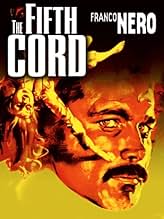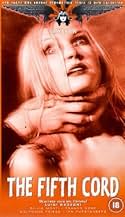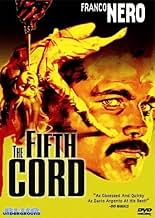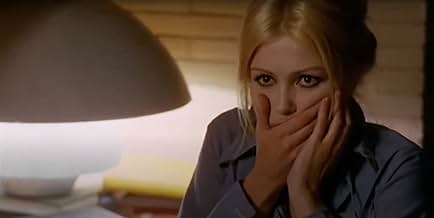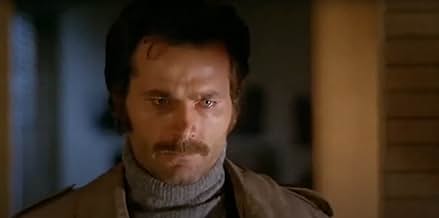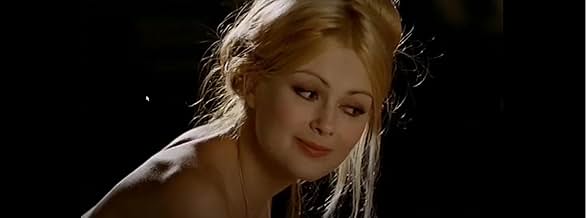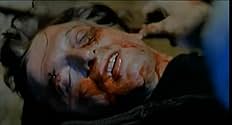VALUTAZIONE IMDb
6,6/10
2874
LA TUA VALUTAZIONE
Un giornalista si trova sulle tracce di un assassino che ha preso di mira le persone intorno a lui, mentre la polizia lo considera un sospetto nelle loro indagini.Un giornalista si trova sulle tracce di un assassino che ha preso di mira le persone intorno a lui, mentre la polizia lo considera un sospetto nelle loro indagini.Un giornalista si trova sulle tracce di un assassino che ha preso di mira le persone intorno a lui, mentre la polizia lo considera un sospetto nelle loro indagini.
- Regia
- Sceneggiatura
- Star
Ira von Fürstenberg
- Isabel Lancia
- (as Ira Fürstenberg)
Luciano Bartoli
- Walter Auer
- (as Luciano Baroli)
Luigi Antonio Guerra
- Man
- (as Guerra L. Antonio)
Michel Barnes
- Tony Volta
- (non citato nei titoli originali)
Jean-Pierre Clarain
- Journalist in Bini's Home
- (non citato nei titoli originali)
- …
Recensioni in evidenza
A stylish, atmospheric giallo. Great score, great locations, superb cinematography by the great Storaro. The story, however, is quite muddled, but here, the mood makes up for that to a large extent. The cheesiest moments are the killings, where the cinematography jarringly becomes quite sloppy and day/night continuity goes out the window. This film makes me more curious about Luigi Bazzonis Footprints On The Moon/Le Orme, which I came across on VHS in a second-hand store many years ago. I was intrigued by the cover and the summary on the box, but I stupidly did not buy it. Regretting that the day after, I went there again and it was gone. Now my hope lies with Blue Underground, may they soon release it on DVD. Back to The Fifth Cord, its interesting to watch the blocking of some dialog scenes. What could easily have become, in a lesser director and cinematographers hands, simple crosscutting between two talking heads, here often becomes beautifully composed wide shots, sometimes with a dolly, sometimes static, using the rooms, spaces and architecture in a very cinematic way, and with great variety of the framing. A great lesson for aspiring filmmakers.
Excellent giallo, with just a touch more of the thriller about it than is usual. Direction is assured, camera-work innovative and exciting with all the performances solid, especially the charismatic Mr Nero. The killer does not restrict themselves to women here, for a change, and has a go at men women and children. Fast moving and most entertaining with no pause for any ponderous detective work. Super stylish with amazingly spacious apartments, swirling staircases and contemporary concrete and glass splendour of late 60's Italian architecture. Last but by no means least a lovely understated but truly effective and sparingly used Morricone soundtrack. It's not a lot more than the same enigmatic theme repeated with various orchestrations but it helps the work enormously, as does the splattering of what sound like industrial music and also the silences, especially for the murders, no crashing crescendo, simply unnerving silence. A fave.
Charismatic international star Franco Nero makes all the difference in this well plotted Giallo co-written by director Luigi Bazzoni, based on a novel by David McDonald Devine. As fans of this genre come to expect, it's a good looking film made with some style by Bazzoni. There's no shortage of red herrings, and the story does keep you guessing - and on your toes. It's got some standout sequences, such as a paraplegic murder victim trying to get to a phone without the aid of a wheelchair, the stalking of an innocent child, and the final chase / fight scene between protagonist and killer. This last bit is very atmospheric. Overall the film does move somewhat slowly, and the script is talky, but it resolves itself in a neat enough way.
Nero is well cast as an alcoholic reporter named Andrea Bild. After a young man named Lubbock (Maurizio Bonuglia) is assaulted, this serves as a sign of further violence: a murderer will soon target specific people, and all of them are people whom Andrea knows. Naturally, the police, led by an inspector played by Wolfgang Preiss, are suspicious of Andrea and *he* suspects that they're tailing him. In order to clear his name, he plays detective on his own.
That aspect of the story is certainly very familiar, but in general "The Fifth Cord" is enjoyable if not the most exciting film of its kind. The cast is good: also appearing are Silvia Monti, Ira von Furstenberg, Edmund Purdom (always nice to see this guy in anything), Rossella Falk, Renato Romano, and Luciano Bartoli. Luscious blonde American actress Pamela Tiffin shows off the goods in one scene. Talented and prolific legendary composer Ennio Morricone does typically solid work in terms of the score.
If the viewer is an aficionado of the Giallo, they should find this to their liking.
Seven out of 10.
Nero is well cast as an alcoholic reporter named Andrea Bild. After a young man named Lubbock (Maurizio Bonuglia) is assaulted, this serves as a sign of further violence: a murderer will soon target specific people, and all of them are people whom Andrea knows. Naturally, the police, led by an inspector played by Wolfgang Preiss, are suspicious of Andrea and *he* suspects that they're tailing him. In order to clear his name, he plays detective on his own.
That aspect of the story is certainly very familiar, but in general "The Fifth Cord" is enjoyable if not the most exciting film of its kind. The cast is good: also appearing are Silvia Monti, Ira von Furstenberg, Edmund Purdom (always nice to see this guy in anything), Rossella Falk, Renato Romano, and Luciano Bartoli. Luscious blonde American actress Pamela Tiffin shows off the goods in one scene. Talented and prolific legendary composer Ennio Morricone does typically solid work in terms of the score.
If the viewer is an aficionado of the Giallo, they should find this to their liking.
Seven out of 10.
Excellent Cinematography & Music. Story is lacking, maybe in the English Translation.
This is the same director and cinematographer who made Footprints on the Moon, excellent movie.
This movie also has great cinematography and the directing/editing is a fine job. Music is good as well. The acting is good. But the story is lacking. Maybe the story is lost in the English translation. Best suspense is when the killer was going after the kid. It's a good thing the kid didn't get killed, that would have been bad, and sick! Maybe in the original Italian, the story holds up better. And maybe some graphic scenes were cut out for the English release. If so, then this is a great film, and great production. But as it stands I can only give it a C, or B -, 6 stars. Worth checking out for the camera work.
This is the same director and cinematographer who made Footprints on the Moon, excellent movie.
This movie also has great cinematography and the directing/editing is a fine job. Music is good as well. The acting is good. But the story is lacking. Maybe the story is lost in the English translation. Best suspense is when the killer was going after the kid. It's a good thing the kid didn't get killed, that would have been bad, and sick! Maybe in the original Italian, the story holds up better. And maybe some graphic scenes were cut out for the English release. If so, then this is a great film, and great production. But as it stands I can only give it a C, or B -, 6 stars. Worth checking out for the camera work.
"I am going to commit murder," whispers our killer, as the camera flits around the jaded revellers at a New Year shindig. "I can imagine the thrill and pleasure I will experience as I stalk my victim..." Shortly after, John Lubbock (Maurizio Bonuglia) survives an attack in an underpass on his way home, and journalist Andrea Bild (Franco Nero), a fellow attendee, decides to investigate. Then a second party goer - invalid Doctor's wife Sophia Bini (Rossella Falk) - is attacked and killed in her home, and Andrea's elderly editor is found dead in a local park, both bodies accompanied by the killer's calling card (a black glove with first one then subsequent fingers cut off). Suddenly, the outspoken, hard-drinking journalist finds himself rising swiftly up the list of suspects.
What raises The Fifth Cord above the average giallo is striking cinematography and a couple of genuinely suspense-filled murders. The sequence involving the Doctor's wife is the most characteristic of the genre. Taking place in a huge and intimidating bedroom it also evokes the Gothic feel of old Hollywood and the memory of a certain Mrs de Winter. Bazzoni expertly handles the build-up of tension, getting the unfortunate Mrs Bini out of bed and crawling along the floor in a rising panic as first her wheelchair then telephone (her lifeline) vanish into the shadows. There's an almost supernatural element at play here. When the familiar gloved hands suddenly appear either side of the screen to slowly descend from behind and wrap themselves around her throat, they seem almost disembodied.
In contrast, the rest of the film is a study in modernity. Everything is concrete and glass, clean lines and polished surfaces. Every shot is carefully and deliberately lensed and filled with geometric shapes and patterns. Edges and shadows converge to corral Nero as the finger points increasingly in his direction. A scene in which he meets with the investigating officer in a subterranean parking lot is particularly well done, where the frosted windows behind the actors are reflected in the roof of the car in front and join with the widescreen framing to form a cage. The ending comprises tough-guy fisticuffs and a pulse-quickening chase sequence through the cadaverous wreck of an abandoned factory where Nero finally unmasks the black-coated killer, having already deduced the real motive, which twists the opening voice-over in a new and ambiguous light.
This is a solid, visually impressive giallo, if at times a little less engaging than it should be. The characters, other than Andrea, aren't effectively introduced or given enough screen time and are too often simply referred to by name, so it's difficult to remember who's who and why we should care. Consequently the narrative sometimes lacks clarity, getting itself into a bit of a muddle during the mid-section, and having spent most of the film presuming events have unfolded over a matter of days only to discover the killings have been occurring for roughly a five month period is a little jarring. There's nothing to suggest the passage of time, though the static environment does correspond with Bazzoni's austere vision.
A cold and relatively bleak film, The Fifth Cord makes the most of its angular urban settings to say something about the fractured nature of modern city life, from Nero's world-weary alcoholic loner to the estranged Doctor and his wife to hardworking single parent Helene (Silvia Monti). A world filled with acquaintances as opposed to friends, where people choose the warm bodies of strangers (filmed here with restraint rather than a gratuitous eye for sleaze) over the ones they may have at home. Nero, though at times out-and-out brutish, brings gravitas (and a suitably chiseled visage) to his genre-standard character, and Monti, in a limited role, manages to be strong and insightful and can keep her head in a crisis, helping to counterbalance the popular view of women in gialli as merely window dressing or cannon fodder. The English dubbing is of a high standard, with Nero providing his own voice. Overall it's more of a straightforward crime caper than a horror yarn, but worth checking out for the arresting visuals alone.
What raises The Fifth Cord above the average giallo is striking cinematography and a couple of genuinely suspense-filled murders. The sequence involving the Doctor's wife is the most characteristic of the genre. Taking place in a huge and intimidating bedroom it also evokes the Gothic feel of old Hollywood and the memory of a certain Mrs de Winter. Bazzoni expertly handles the build-up of tension, getting the unfortunate Mrs Bini out of bed and crawling along the floor in a rising panic as first her wheelchair then telephone (her lifeline) vanish into the shadows. There's an almost supernatural element at play here. When the familiar gloved hands suddenly appear either side of the screen to slowly descend from behind and wrap themselves around her throat, they seem almost disembodied.
In contrast, the rest of the film is a study in modernity. Everything is concrete and glass, clean lines and polished surfaces. Every shot is carefully and deliberately lensed and filled with geometric shapes and patterns. Edges and shadows converge to corral Nero as the finger points increasingly in his direction. A scene in which he meets with the investigating officer in a subterranean parking lot is particularly well done, where the frosted windows behind the actors are reflected in the roof of the car in front and join with the widescreen framing to form a cage. The ending comprises tough-guy fisticuffs and a pulse-quickening chase sequence through the cadaverous wreck of an abandoned factory where Nero finally unmasks the black-coated killer, having already deduced the real motive, which twists the opening voice-over in a new and ambiguous light.
This is a solid, visually impressive giallo, if at times a little less engaging than it should be. The characters, other than Andrea, aren't effectively introduced or given enough screen time and are too often simply referred to by name, so it's difficult to remember who's who and why we should care. Consequently the narrative sometimes lacks clarity, getting itself into a bit of a muddle during the mid-section, and having spent most of the film presuming events have unfolded over a matter of days only to discover the killings have been occurring for roughly a five month period is a little jarring. There's nothing to suggest the passage of time, though the static environment does correspond with Bazzoni's austere vision.
A cold and relatively bleak film, The Fifth Cord makes the most of its angular urban settings to say something about the fractured nature of modern city life, from Nero's world-weary alcoholic loner to the estranged Doctor and his wife to hardworking single parent Helene (Silvia Monti). A world filled with acquaintances as opposed to friends, where people choose the warm bodies of strangers (filmed here with restraint rather than a gratuitous eye for sleaze) over the ones they may have at home. Nero, though at times out-and-out brutish, brings gravitas (and a suitably chiseled visage) to his genre-standard character, and Monti, in a limited role, manages to be strong and insightful and can keep her head in a crisis, helping to counterbalance the popular view of women in gialli as merely window dressing or cannon fodder. The English dubbing is of a high standard, with Nero providing his own voice. Overall it's more of a straightforward crime caper than a horror yarn, but worth checking out for the arresting visuals alone.
Lo sapevi?
- QuizIsabelle Lancia smokes Astor brand cigarettes, a common favorite of leading ladies in gialli.
- BlooperWhen Andrea enters a car after seeing a woman dead in the bathtub, a cut can clearly be seen when he grabs the wheel.
- Citazioni
Andrea Bild: I may have become a piece of shit but you are what you are when you started, a bastard who sold his soul.
- Versioni alternativeAlthough intact on the cinema a 2 sec cut was made to the UK Redemption video release to edit a throat-cutting.
- ConnessioniFeatured in Giornata nera (2006)
- Colonne sonorePop! Goes the Weasel
(uncredited)
Traditional
I più visti
Accedi per valutare e creare un elenco di titoli salvati per ottenere consigli personalizzati
- How long is The Fifth Cord?Powered by Alexa
Dettagli
- Data di uscita
- Paese di origine
- Lingua
- Celebre anche come
- The Fifth Cord
- Luoghi delle riprese
- Incir De Paolis Studios, Roma, Lazio, Italia(as Incir De Paolis Studios)
- Aziende produttrici
- Vedi altri crediti dell’azienda su IMDbPro
- Tempo di esecuzione1 ora 30 minuti
- Mix di suoni
- Proporzioni
- 1.85 : 1
Contribuisci a questa pagina
Suggerisci una modifica o aggiungi i contenuti mancanti

